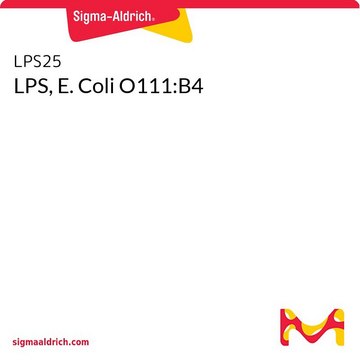SMB00704
Lipopolysaccharides from Proteus mirabilis
purified by phenol extraction
Sinónimos:
LPS
Iniciar sesiónpara Ver la Fijación de precios por contrato y de la organización
About This Item
Productos recomendados
biological source
bacterial (Proteus mirabilis)
Quality Level
form
lyophilized powder
purified by
phenol extraction
impurities
<3.00% protein (Lowry-TCA)
color
white to faint yellow
solubility
water: 0.90-1.10 mg/mL, slightly hazy to hazy, colorless to light yellow
shipped in
ambient
storage temp.
2-8°C
General description
Lipopolysaccharides (LPS′s) are complex glycolipids that are characteristic components of the cell wall of Gram-negative bacteria. They consist of a lipid A moiety linked to an antigenic O-polysaccharide.
Proteus mirabilis is a Gram-negative facultative anaerobic rod-shaped bacterium. Bacteria of the genus Proteus of the family Enterobacteriaceae are opportunistic human pathogens responsible for wound and burn infections as well as skin, eye, ear, nose, throat, urinary tract, and gastrointestinal infections and bacteremias.
Proteus mirabilis is a Gram-negative facultative anaerobic rod-shaped bacterium. Bacteria of the genus Proteus of the family Enterobacteriaceae are opportunistic human pathogens responsible for wound and burn infections as well as skin, eye, ear, nose, throat, urinary tract, and gastrointestinal infections and bacteremias.
Application
- Lipopolysaccharide structure modulates cationic biocide susceptibility and crystalline biofilm formation in Proteus mirabilis.: The study explores how variations in lipopolysaccharide structure affect the susceptibility of Proteus mirabilis to biocides and its ability to form crystalline biofilms, informing strategies to combat biofilm-associated infections (Clarke et al., 2023).
Biochem/physiol Actions
Lipopolysaccharide (LPS) and its lipid A moiety stimulate cells of the innate immune system by the toll-like receptor 4 (TLR4), a member of the toll-like receptor protein family, which recognizes common pathogen-associated molecular patterns (PAMPs). Lipid A plays a role in the biological properties attributed to endotoxic LPS. LPS is a highly immunogenic antigen that has the ability to enhance immune responses.The outer-membrane lipopolysaccharide is considered an important virulence factor of Proteus. It has been suggested that the immunological response against P. mirabilis, LPS might play a role in rheumatoid arthritis. A possible correlation between the abundance of P. mirabilis in the intestine and obesity was suggested recently. The purified LPS from P. mirabilis OXK is used in the Weil-Felix test for the diagnosis of rickettsiosis (scrub typhus) caused by the bacterium Orientia (Rickettsia) tsutsugamushi.
Preparation Note
Soluble in water and cell culture medium DMEM (1 mg/mL) yielding a clear to slightly hazy solution.
Other Notes
To gain a comprehensive understanding of our extensive range of Lipopolysaccharides for your research, we encourage you to visit our Carbohydrates Category page.
Related product
Referencia del producto
Descripción
Precios
Storage Class
11 - Combustible Solids
wgk_germany
WGK 3
flash_point_f
Not applicable
flash_point_c
Not applicable
Elija entre una de las versiones más recientes:
Certificados de análisis (COA)
Lot/Batch Number
¿No ve la versión correcta?
Si necesita una versión concreta, puede buscar un certificado específico por el número de lote.
¿Ya tiene este producto?
Encuentre la documentación para los productos que ha comprado recientemente en la Biblioteca de documentos.
A S Swierzko et al.
Biochemistry. Biokhimiia, 62(1), 21-27 (1997-01-01)
Sugar analysis and 1H- and 13C-NMR spectroscopic studies showed that various strains of Proteus mirabilis OXK used as antigens in the Weil-Felix test for serodiagnosis of rickettsiosis (scrub typhus) produce lipopolysaccharides (LPSs) with the same O-specific polysaccharide chain having the
Distribution of core oligosaccharide types in lipopolysaccharides from Escherichia coli.
Amor K, et al.
Infection and Immunity, 68(3), 1116-1124 (2000)
Analysis of Lipopolysaccharides of Gram-Negative Bacteria
Mayer H, Tharanathan RN, Weckesser J
Methods in Microbiology, 18, 157-207 (1985)
Molecular basis for structural diversity in the core regions of the lipopolysaccharides of Escherichia coli and Salmonella enterica.
Heinrichs D E, et al.
Molecular Microbiology, 30(2), 221-232 (1998)
Novel adjuvants & delivery vehicles for vaccines development: a road ahead.
Mohan T, et al.
The Indian Journal of Medical Research, 138(5), 779-795 (2013)
Nuestro equipo de científicos tiene experiencia en todas las áreas de investigación: Ciencias de la vida, Ciencia de los materiales, Síntesis química, Cromatografía, Analítica y muchas otras.
Póngase en contacto con el Servicio técnico


